#ross burt
Text
Julie Newmar was the first actress to protray Catwoman on the Adam West Batman TV show. She made her debute on March 16, 1966. It is said that she designed and made her own costume. ("The Purr-fect Crime", Batman, TV, Event).
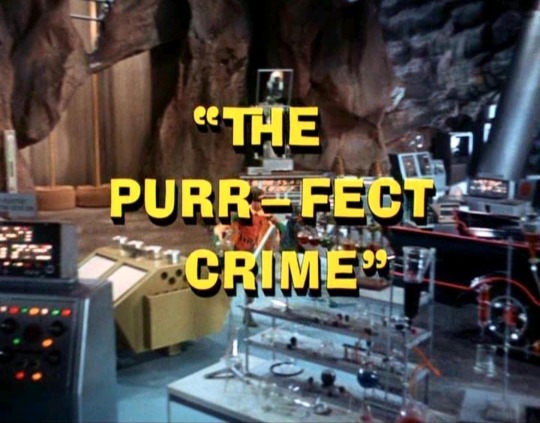
#nerds yearbook#real life event#first appearance#tv#march#1966#dc#dc comics#stanley ralph ross#lee orgel#bob kane#james sheldon#julie newmar#catwoman#batman#adam west#burt ward#robin#dick grayson#alfred pennyworth#alan napier#neil hamilton#commissioner james gordon#stafford repp#chief o'hara#madge blake#mrs cooper#harry holocombe#william dozier#elisa ingram
33 notes
·
View notes
Text
Miss Fisher’s Murder Mysteries ‘Queen of the Flowers’ has had me bawling tonight. My heart breaks for every single one of the young girls in this episode. It’s so heavy to watch! 😭
The sexual abuse of two of the girls, the blackmail one was held to and the maternal trauma and desperation to protect her mother from Jane, the tears have been flowing. Maybe it’s because I was a teenager the same age as these girls when I first watched the episode almost a decade ago, but now that I am significantly older I see them as the abused and mistreated children they are. They’re so little in my eyes upon this rewatch. I can’t stomach the way Kitty and Rose were treated, what Jane had to witness with her mother’s mental health struggles.
Phryne’s full commitment to them and their wellbeing is gorgeous; she’s so protective of them and she wants them to speak their truth and get the justice and resolutions they deserve. She’s a safe person for them and they know that when they come to her, that they will be believed and loved. These girls need that so much.
As much as I loved the show as a teenager, there were some parts of the storyline that went completely over my head because I was far too young to truly understand the gravity of them. I am glad I’m going back to watch this extraordinary series as an adult. I’m seeing it through new eyes and the nuances and humanity side of it I am totally computing now.
Other moments that broke my heart: 1) Phryne’s worry when Jane and Rose couldn’t be found in the morning. 2) Jane’s mother losing control of her own mind, and Jane needing to bring her back to earth but struggling with this because she’s only a child, damn it! This is too much for her! 3) When Phryne; upon realising Kitty was murdered by a significantly larger man, feels guilty for not teaching the girls actual skills they need to survive life.
Quotes: “She’s not mean. She just needs me. I’m sorry I didn’t tell you.” ~ Jane (Ruby Rees was such an incredible actress at this age. I just want to hug Jane! Little darling!)


#phryne fisher#essie davis#jane ross#ruby rees#jack robinson#nathan page#hugh collins#hugo johnstone burt#taylor ferguson#miss fisher's murder mysteries#just bawling tonight - this episode was so much heavier than I remembered it to be
59 notes
·
View notes
Text

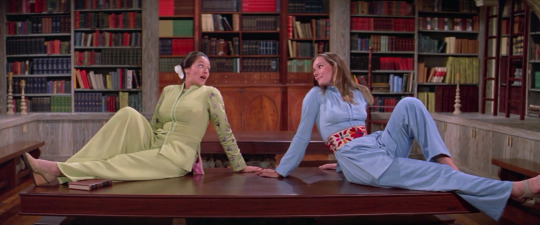

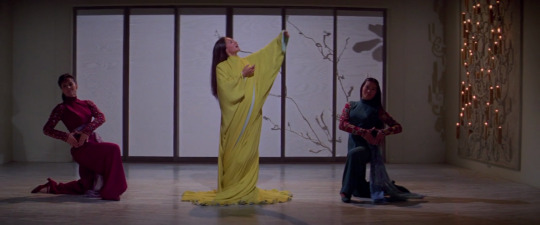
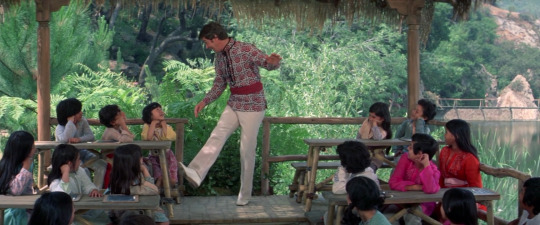
For this week's Throwback Thursday, Jen invites Darren Herczeg to Shangri-La to talk about the movie that killed Ross Hunter's producing career, the incredibly ill-conceived musical version of LOST HORIZON. Hear the whole episode free at our Patreon!
#movies#podcast#cult movies#70s movies#olivia hussey#bobby van#sally kellerman#george kennedy#peter finch#michael york#burt bacharach#hal david#musicals#movie musical#ross hunter
1 note
·
View note
Text
Watch "Butch Cassidy and the Sundance Kid • Raindrops Keep Fallin' on My Head • B.J. Thomas" on YouTube
youtube
0 notes
Text
youtube
Raindrops Keep Fallin' on My Head
Burt Bacharach
Butch Cassidy and the Sundance Kid
1969
Robert Redford
Paul Newman
Katharine Ross
#Raindrops Keep Fallin' on My Head#butch cassidy and the sundance kids#paul newman#robert redford#katharine ross#burt bacharach#1969#Youtube
0 notes
Text
Franklin's lost expedition crew
I was looking at posts about AMC's The Terror and I kept getting confused by the use of first names, so I wanted to see how many of the characters had the same names. Arranging the crew in alphabetical order, I got:
1 x Abraham (Seeley)
4 x Alexander (Berry, McDonald, Paterson, Wilson)
5 x Charles (Best, Coombs, Des Voeux, Johnson, Osmer)
1 x Cornelius (Hickey)
2 x Daniel (Arthur, Bryant)
3 x David (Leys, Macdonald, Young) + Bonus: Bryant in the show but most historical sources I found list him as Daniel
1 x Edmund (Hoar)
3 x Edward (Couch, Genge, Little)
2 x Edwin (Helpman, Lawrence)
3 x Francis (Crozier, Dunn, Pocock)
1 x Frederick (Hornby) + Bonus: Des Voeux, whom I have seen referred to as Frederick rather than Charles on occasion
6 x George (Cann, Chambers, Hodgson, Kinnaird, Thompson, Williams)
1 x Gillies (MacBean)
1 x Graham (Gore)
7 x Henry/Harry (Collins, Goodsir, Le Vesconte, Lloyd, Peglar, Sait, Wilkes)
10 x James (Brown, Daly, Elliot, Fairholme, Fitzjames, Hart, Reid, Ridgen, Thompson, Walker) + Bonus: Ross, who was not part of the expedition but appears in the show
23 x John (Bailey, Bates, Bridgens, Brown, Cowie, Diggle, Downing, Franklin, Gregory, Hammond, Handford, Hartnell, Irving, Kenley, Lane, Morfin, Murray, Peddie, Strickland, Sullivan, Torrington, Weekes, Wilson)
2 x Joseph (Andrews, Healey)
1 x Josephus (Geater)
1 x Luke (Smith)
1 x Magnus (Manson)
1 x Philip (Reddington)
1 x Reuben (Male)
2 x Richard (Aylmore, Wall)
8 x Robert (Carr, Ferrier, Golding, Hopcraft, Johns, Sargent, Sinclair, Thomas)
3 x Samuel (Brown, Crispe, Honey)
1 x Solomon (Tozer)
16 x Thomas (Armitage, Blanky, Burt, Darlington, Evans, Farr, Hartnell, Honey, Johnson, Jopson, McConvey, Plater, Tadman, Terry, Watson, Work)
22 x William (Aitken, Bell, Braine, Clossan, Fowler, Gibson, Goddard, Heather, Hedges, Jerry, Johnson, Mark, Orren, Pilkington, Read, Rhodes, Shanks, Sims, Sinclair, Smith, Strong, Wentzall)
#i saw the 23 johns coming but not the 22 williams#there may be a mistake somewhere but that was a lot of names#amc the terror#the terror#terrorposting
88 notes
·
View notes
Photo

Butch: What happened to the old bank? It was beautiful.
Guard: People kept robbing it.
Butch: Small price to pay for beauty.
- William Goldman, Butch Cassidy and the Sundance Kid: Screenplay (1970)
In a brilliant William Goldman script peppered with memorable lines, the first exchange sets the tone of this classic Western movie. Butch looks around a bank at closing time, chatting with the security guard as he perhaps sizes up his next job.
“What happened to the old bank? It was beautiful.”
“People kept robbing it.”
“That’s a small price to pay for beauty.”
Right away, Goldman establishes Butch as a charismatic mouthpiece for the quip-ready screenwriter, contrasting nicely with the Sundance Kid, Robert Redford’s taciturn sharpshooter. But he’s also created two heroes who break the western mold, neither justice-seeking white-hats nor grizzled, sneering black-hats, and not as traditionally masculine as either party. Butch is a man who appreciates beauty and art, but doesn’t have the stomach for violence; it’s not until late in the film that we (and the Kid) discover that he’s never shot a man before and he looks sickened to have to do it. He’s a pleasure-seeker above all else: robbing banks and trains are his way to make an easy living and enjoy whatever sinful freedoms his vocation affords him.
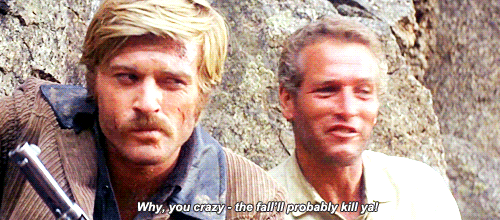
Audiences in 1969 were all too happy to embrace the light, quippy irreverence of Butch Cassidy and the Sundance Kid after a turbulent summer, and Goldman, director George Roy Hill, and the two impossibly handsome stars made them feel cool for doing it. True Grit had performed well earlier in the year as a throwback to the genre’s past, giving John Wayne a proper victory lap, but Butch Cassidy was thoroughly modern, a star-making vehicle for Newman and Redford that reflected a need for the genre to turn the page and that feels as much of its time as it does authentic to Wyoming in the late 1890s. With Katherine Ross at the centre of a love triangle between friends, the film attempted to bring a French Jules and Jim vibe to the American mainstream, taking a lesson from the French new wave on how to revive old Hollywood craft.
It still works spectacularly well. There’s an alchemy up and down the production. Redford possesses easy charm, which parries so well with Newman’s smarts that the two would run it back again with Hill a few years later in The Sting.

The pop doodling of Burt Bacharach’s musical score is about as far from a traditional western score as possible, but it somehow meshes with the sepia sheen of Conrad Hall’s photography, which burnishes the legend of these two men while their story is still being told. And while Goldman’s screenplay dances on the edge of glib, it’s lively and sophisticated, with a strong theme about the capitalist forces that really tamed the Wild West.
Butch Cassidy and the Sundance Kid is such a rollicking good time that it takes a while to notice it’s about the end of the line for its heroes, whose celebrity is already widespread when the film opens and ultimately hastens their demise. “Your times is over and you’re gonna die bloody,” warns a sheriff, prophetically, in an early scene, and the film is mostly about Butch and Sundance getting chased out of America by hired guns and dying at the hands of the Bolivian army.

They’re mostly guilty of stealing from the wrong guy: EH Harriman, the railroad tycoon, spends more trying to catch them than they rob from his safes, but it’s an opportunity for a powerful man to send a message about who’s really in charge. Guys like Butch and Sundance can handle local lawmen and half-hearted posses, but they can’t fight progress. The EH Harrimans along with the the Rockefellers, JP Morgans, and the Carnegies and of the world - the original robber barons - would make certain of that.
#goldman#william goldman#quote#butch cassidy and the sundance kid#film#movie#cinema#hollywood#paul newman#robert redford#cowboys#western#america#wild west#society#culture#arts#capitalism
148 notes
·
View notes
Text
Ross Lore Part 1
Separate posts + long doc won in the end, so we’re doing it like this
This comes from the video A Parkour Map Designed to Make Us RAGE!!!, posted on August 2, 2020. While this isn't the first time that Max and Ross' characters have been given lore (the Overalls v. Jorts court case preceded this), this appears to be the first time that the running gag of "Ross Lore" was mentioned by name. Below are summaries of the notable pieces of Ross Lore mentioned:
Qbert’s bro, Burt is a sponge block given to Max and Ross at the beginning of the level. Partway through the video Ross locks himself in a shelter of wooden planks to get out of doing the parkour. He places Bert down and Max breaks him, leading to the creation of Sponge. Sponge is a Minecraft sponge block and Ross’ good buddy that he hasn’t seen in weeks. He brought the blue punch that tasted green to Max’s birthday.
Ross likes to use a dagger in combat.
Ross burnt down an orphanage to stop what he calls the moon people. Max claims that he burnt down the wrong orphanage, but Ross says that he did it first to prevent the moon people from doing it and caused them to leave as a result. According to Max the other orphanage was their target and the reason they left was because they accomplished their goal, thus making Ross’ arson pointless
Ross took a group of elderly people camping and returned with 4 more elderly folks at the end. They went into the woods as a group of 6 and came back as a group of 14.
Ross taught a group of kids how to swim in shark infested waters. He refuses to elaborate on it.
Ross invented toothpicks (patent and everything) and sued another guy who claimed to have invented toothpicks.
Ross invented being pregnant.
Ross was bullied on the playground by school kids.
Ross crashed a wedding and ended up marrying the father.
Ross’ left eye is glass.
Ross opened a refrigerator store for 2 months. During that time he only sold 1 fridge and went bankrupt, then faked his death in a freak refrigerator accident in Milwaukee. Ross is the moniker he took after faking his death, though he refuses to share his original name.
Ross took 7 people and a parrot to prom.
Ross dug a huge hole at the beach and buried 4 kids. They were attempting to build a tunnel system underneath a sandcastle and it caved in. Ross himself almost got buried but managed to dig his way out. Whether the kids died or not is never elaborated on.
Ross opened a motel for dogs after watching the movie Hotel.
Ross got caught in a ladder. As a result he still has 19 years of bad luck to go and a prosthetic foot.
At the age of 14, Ross had to get his 7th and 6th fingers removed on his right hand. Max remembers it as his left, and Ross reminds him that that was his foot.
Ross had to get the extra toes on his left foot removed, which he keeps in a jar.
Ross soul bonded to Van Gogh and tried to cut off his own ear, but the safety scissors didn’t work. Max says that they did work and he passed out, though his ear was presumably sewn back on.
Ross sunk a ship in the parking lot, apparently in an attempt to test the boat. Ross said that it was hard to get it into the pavement. An unnamed “he” got really mad at this.
Ross threw up at the movie theater and at a funeral. They don’t talk about the funeral incident.
Growing up, Ross told his guidance counselor that he wanted to be an astronaut pirate and ended up becoming one somehow. The guidance counselor died at some point, and this funeral may be related to the other funeral incident.
Ross beat the sun in a staring contest. It is partially the reason why he has a glass eye
The other reason is the time he helped invent peanut butter.
Ross is the hero of Pennsylvania. He says to check the history books.
Ross named McDonalds. The founder originally wanted to go with “Wacky Floppy Burger Buns”, but Ross told him to call it McDonalds.
Ross volunteered at the retirement home and beat some ladies at bingo.
There was another incident involving old ladies in which they were running an illegal knitting business and “Professor Ross had to teach them a lesson”. They apparently threw the first punch and threw knitting needles at him so Ross pulled out his katana and beat them up.
The censor duck that bleeps out curse words in Max’s videos does it as a paid job and needs the money to turn the heating bill on. He also needs to pay back his bail to Ross in order to see his ducklings again.
Other non-Ross Lore notable things:
Max points out that bottom of Ross’ left foot on his Minecraft skin is discolored.
31 notes
·
View notes
Text

Darth Malgus
by Ross Burt
62 notes
·
View notes
Text
T7S characters/family trees. A brief breakdown of eye colors.
Brown: Fez, Jack, Jackie*, Kelso, Leo, WB
Blue: Bea, Bernice*, Bob, Burt, Donna, Hyde, Laurie, Kitty, Midge, Pam, Red
Green: Eric. By process of elimination, if his eyes came from a grandparent gene, it had to come from his paternal grandfather (see above).
Hazel: Edna. So, Hyde's eye color also had to come from a grandparent gene (or from even further back).
Notes:
1. Mila had mismatched eyes at the time of T7S, but in season 2, it's clearly stated that Jackie's eyes are brown.
2. It is stated on numerous unofficial bio sites that Marion Ross's (Bernice's) eyes are brown, but if you look at her pictures, they are clearly blue.
3 notes
·
View notes
Text

Michael Fassbender in The Killer (David Fincher, 2023)
Cast: Michael Fassbender, Tilda Swinton, Charles Parnell, Arliss Howard, Kerry O'Malley, Sophie Charlotte, Emiliana Pernia, Gabriel Polanco, Sala Baker, Monique Ganderton, Daran Norris, Jack Kesy. Screenplay: Andrew Kevin Walker, based on a graphic novel series by Alexis Nolent and Luc Jacamon. Cinematography: Erik Messerschmidt. Production design: Donald Graham Burt. Film editing: Kirk Baxter. Music: Trent Reznor, Atticus Ross.
In essence, The Killer is a routine thriller about a hit man who screws up and then has to undo the consequences of his screwup. But director David Fincher, screenwriter Andrew Kevin Walker, and actor Michael Fassbender make it seem fresh and novel, not by departing from formula but by creating characters and giving them something clever to say. Fassbender is The Killer (most of the dramatis personae are given labels rather than names), a lean, mean killing machine who rises above that cliché by a variety of quirks, including an addiction to maxims and mottoes that we hear from him constantly in voiceover: "Stick to your plan. Anticipate, don't improvise. Trust no one. Never yield to an advantage. Fight only the battle you're paid to fight." Even by itself that constant voiceover could be annoying, except that Fassbender makes it amusing by intoning it in a flat American accent, and by occasionally failing to follow his own advice. Fincher spends a long time on the setup to the first kill, which makes it even more startling when the suspense is broken by the Killer's mistake. There's some swift action as he gets rid of the equipment used in the shoot, then boards a plane (using one of his many passports and credit cards, all carrying fake names borrowed from TV characters) for his home in the Dominican Republic, where he finds that he still has to keep running, eliminating not only those pursuing him, but also everybody else who knows his true identity. These incidents introduce us to a variety of characters, wittily played by, among others, Charles Parnell (The Lawyer, aka Hodges, who is a middle man between The Killer and his targets), Tilda Swinton (The Expert, a fellow assassin who knows his identity), and Arliss Howard (The Client, one of the few people The Killer manages to intimidate but not kill). All of this nonsense -- which is praise, not criticism -- is set to a variety of songs, mostly by the Smiths, whose dark humor perfectly complements the style of the movie. I could quibble about this being one of those films in which the big fight scene takes place in the dark, so you're never quite sure who's beating whom, but then moral ambiguity is the whole point of the movie.
5 notes
·
View notes
Note
she had the world by panic at the disco (dont cringe its one of their older songs so its good. ryan ross is there) is burt and mitzi's failmarriage coded. do you see the vision
anon, you’re a GENIUS! you understand me we are high fiving we are swimming in the same stream!
The sun was always in her eyes
She didn't even see me
But that girl had so much love
She'd wanna kiss you all the time
Yeah, she'd wanna kiss you all the time
man, that’s fuckin’ true. the sun really is always in her eyes. you KNOW how i feel about those eyes! i’m crazy about them!
#post office#adina's originals#the fabelmans#burt fabelman#mitzi fabelman#paul dano#michelle williams
4 notes
·
View notes
Text
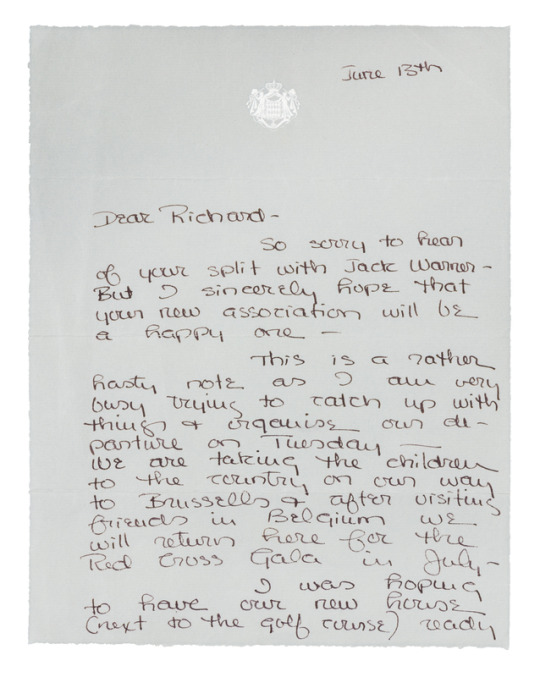
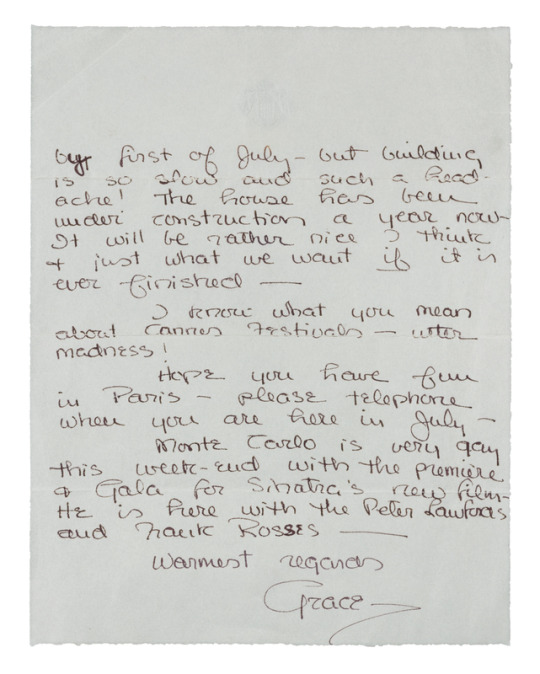

Letter from Princess Grace of Monaco to Warner Brothers executive Richard Gully dated in Monaco on June 12, 1958. It creased. "I know what you mean about Cannes Festivals-what madness! I hope you have fun in Paris." The princess writes former Warner Brothers employee, and assistant to Jack L. Warner: "So sorry to hear of your split with Jack Warner - But I sincerely hope that your new association will be a happy one." Gully formed his own public relations firm in 1959, representing celebrities such as Angie Dickinson, Burt Bacharach, Jill St. John, and Darren McGavin. Princess Grace concludes: "Monte Carlo is very gay this week-end with the premiere and Gala for Sinatra's new film - He is here with the Peter Lawford's and Frank Rosses."
Property from the Robert L. McKay Collection.
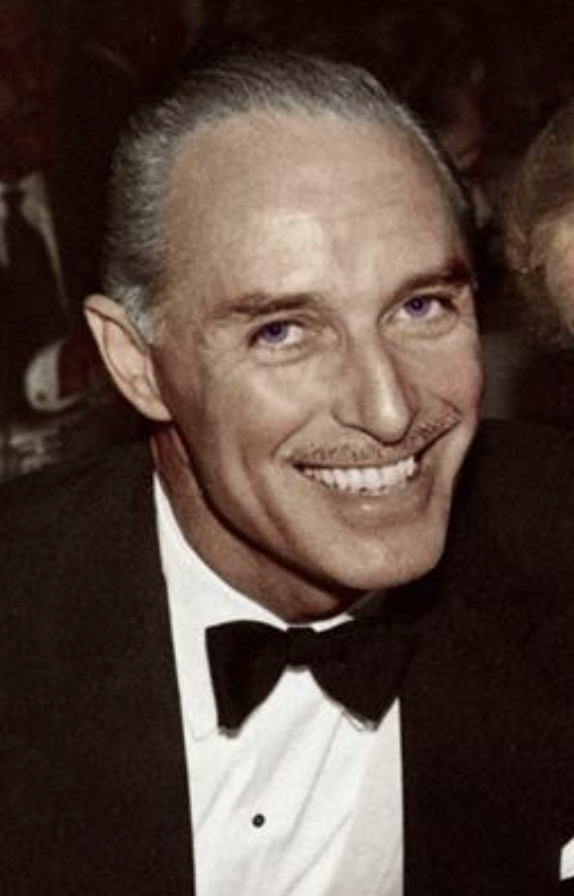
Richard Gully in the 1950s.
3 notes
·
View notes
Text
I just realized my dad was a nudist in the hopes of grooming a prostitute. He likely paid my sexual assaultist to do that to me because he realized how repulsed my older sisters were by his junk and not attracted to him. I get the feeling he tried to coerce his older daughters to ultimately have sex with them, but he abandoned ship before they would catch on because they weren't even sorta into it. He knew I was shy of him cuz his vibes were putrid and I immediately knew I wanted nothing to do with him. He scared the living shit out of me. I was afraid of Ron too, and I hated that he was right about that. So I was taught how to hate instead. And a few years after that, I learned to fear that wrath, how to stop it. and then not that long ago, I learned how to use it for justice. I want to be a warrior like Captain America. I want to be a mother like Mary Poppins. I want to be a friend like Auntie Mame. To be a force for positive change like Mrs. Harris. To be as comforting as Mr. Rogers. To be as soothing and gentle as Bob Ross. To have the curious zeal of Steve Irwin. To have the childhood wisdom of Sesame Street and Arthur. To have a critical thinking mind like Cyberspace. To have the group problem solving skills from Dragon Tales. To have an appetite for reading from Reading Rainbow. An appetite to learn about science from Bill Nye and the Magic School Bus. To be a benevolent manipulator like Professor Harold Hill and Burt from Mary Poppins. I want to live with my heart wide open for everything, including the things that are going to kill me. I will not wait for the dying of the light, I'll stomp it out myself and go down swinging, with my boots on. I can live on movie quotes alone now.
4 notes
·
View notes
Text
the way that irving / burt scene takes place in a room full of plants ... a sanctuary among the endless white corridors ... [ ross gay voice ] i remember my colors green im spring
15 notes
·
View notes
Text
The Fabelmans
Every movie, in one way or another, is a chance to peer inside the mind and soul of its director. Steven Spielberg’s movies have never shied away from this but, for reasons both obvious and not, The Fabelmans is by far his most revelatory.
The Fabelmans is many things. It’s a (mostly) autobiographical coming of age tale that mirrors his own experiences growing up a Jewish kid in the suburbs. It’s a confessional about his struggle to relate to any family member other than his (would be) concert pianist mother, the only person who encouraged or even understood his artistic inclinations and dreams. But more than anything, The Fabelmans is Spielberg waxing nostalgic about why he loves movies.
Sammy Fabelman (Gabriel LaBelle) isn’t great at talking to girls. He can’t play sports. He mostly argues with his father and three younger sisters. Not much in life seems to make sense to him, except for movies. And not just watching them, though he is entranced from the moment he first sits in a theater. Sammy becomes obsessed with storyboarding, cinematography, editing. It’s like he’s found a missing piece of himself. He makes movies because it’s all he knows how to do, because it’s all he can do, especially when his life begins slowly spiraling beyond his control.
Spielberg has long used his movies to communicate his lived experiences. It’s impossible not to read elements of Close Encounters of the Third Kind and even Indiana Jones and the Last Crusade as anything other than metaphors for his own relationship with his father, for instance. He’s talked at length about how E.T. was born from an attempt to write a story about his parents’ divorce. The Fabelmans takes things several steps further (via the help of writer Tony Kushner) and pushes the subtext into text. Granted, not every element is a direct lift from his own life, but the broad strokes are there with his aforementioned mother and a brilliant electrical engineer father who frequently moves his family to new states as he pursues work on the cutting edge of computers.
The only constant in life for Sammy is movies. The soft flicker of the projector is a comfort. The stories he conjures are the only things he has control over. But more than anything, he slowly comes to understand the power those stories have on the people he shares them with. It takes a fateful encounter with his Uncle Boris (Judd Hirsch) for Sammy to realize that his hobby can be and is something more than just entertainment. But once that epiphany is reached, he knows he’s incapable of doing anything else.
All of this is intertwined with the rollercoaster of being a child, and often the only Jewish one around (save for his siblings). He’s ruthlessly mocked and even beaten simply because of his family’s faith. And yet it is a movie that helps him rise above it.
Thankfully, none of this comes across as navel-gazing or self-aggrandizement and is instead a warts-and-all love letter to everything that brought Spielberg to where he is. He isn’t shy about pointing out how aloof Sammy is. For as clearly frustrated as Spielberg was with his father, he still paints Burt (Paul Dano) as a highly affectionate, if awkward, parent who just wants to do right by his family. It may well be my favorite performance Dano’s ever delivered.
Judd Hirsch gives a bone-shaking performance as Sammy’s bombastic uncle. It’s the kind of work that can only be compared to Alec Baldwin’s similarly brief appearance in Glengarry Glen Ross. You never see him again, but his words reverberate throughout and set the course for everything else to come. Hirsch is tremendous here and were it not for Ke Huy Quan’s incredible work in Everything Everywhere All At Once there’s no one else who I’d want to win Best Supporting Actor at next year’s Oscars ceremony.
It’s Michelle Williams, though, who delivers the standout performance, finding a perfect balance of joy, elation, love, frailty, sadness and fallibility. It’s a layered, often heart-wrenching display of acting that in some ways is the very soul of Spielberg’s story.
If there’s a significant flaw within it’s that for a movie titled The Fabelmans, we never get a complete picture of the entire Fabelman family. Sammy’s three sisters are all drastically under-written as characters and we really only get a single major bit of interaction between him and one of them (good though it is). Granted, this is intended to be Sammy’s story and it’s entirely possible this approach was by design and Spielberg’s own relationship with them was just as sparse, but it stands out all the same.
The Fabelmans is as heartfelt as anything Spielberg has ever made or likely ever will make. It’s a movie that proudly and with great delight and love wears its heart on its sleeve. In a popular culture where biting sarcasm and post-modern deconstruction are frequently favored, it almost feels lightly daring for The Fabelmans to embrace its audience with such blatant affection and sentimentality. Not that I would expect anything less from its director. I’m just glad he’s still doing what clearly means the world to him.
4 notes
·
View notes